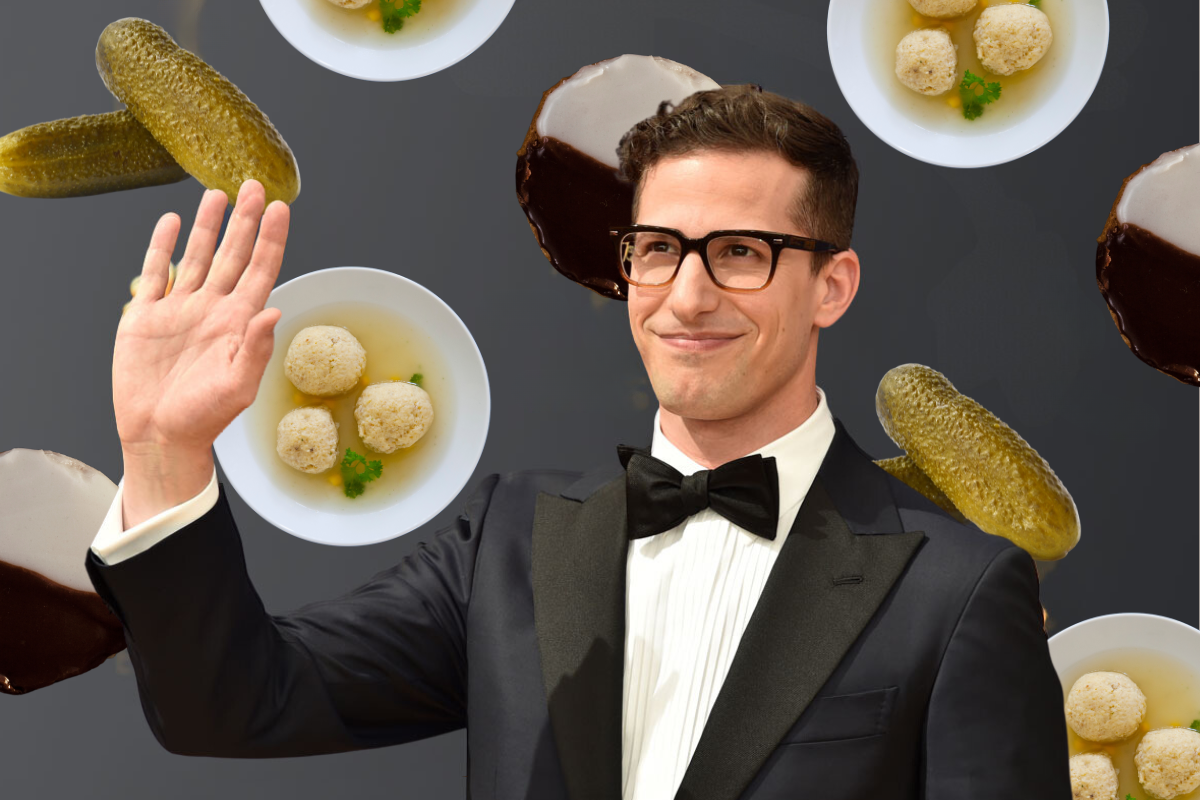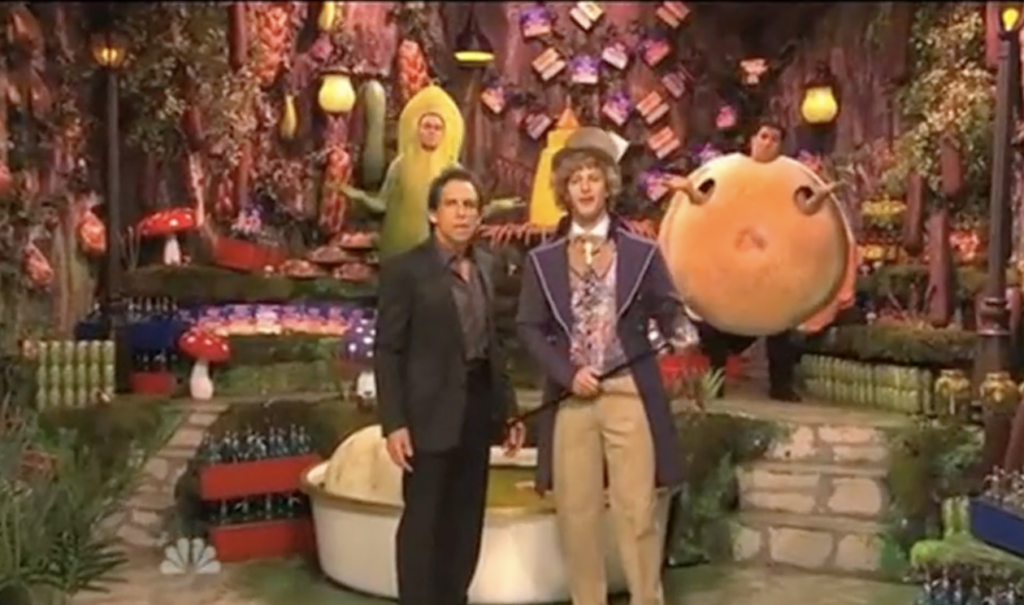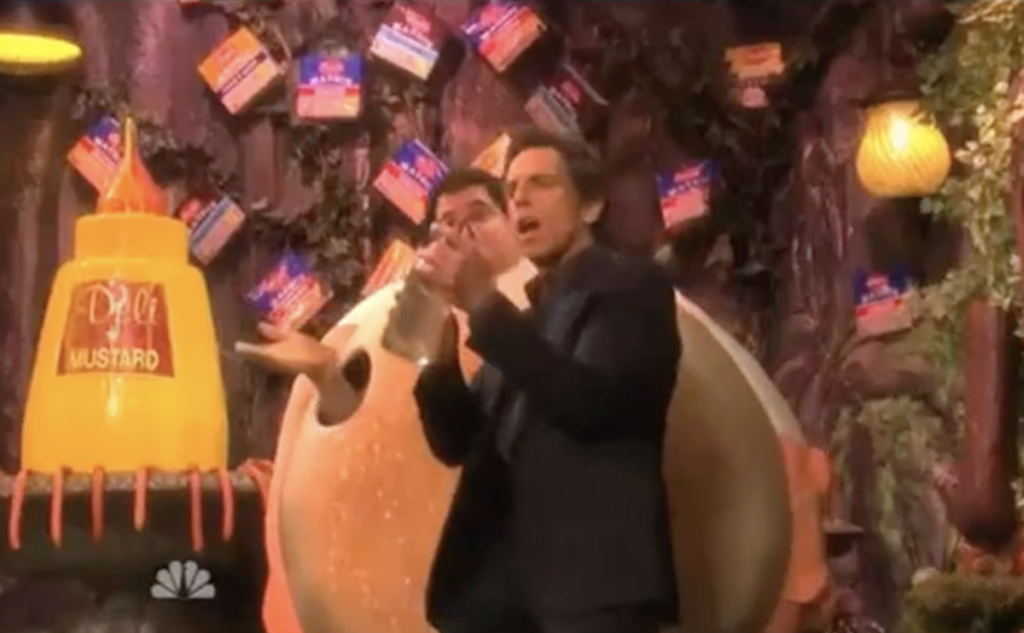Everyone is talking about the upcoming Willy Wonka movie, “WONKA,” which stars Jewish actor Timothee Chalamet, and tells the origin story of the iconic candy maker from the Roald Dahl tale of “Willy Wonka and the Chocolate Factory.”
Chalamet is, as most of us know, not the first Jew to play Wonka — the incredible Gene Wilder entranced generations of kids when he played Wonka in the 1971 movie. May his memory be a blessing.
Yet, what you may not know is that another famous Jewish actor once played Wonka on national TV. The year was 2011, and Ben Stiller was hosting “Saturday Night Live.” It was Yom Kippur. Stiller opened his monologue by talking about how he was a little delirious with hunger because of the holiday’s fast, when all of the sudden, Andy Samberg walked on stage, dressed in the purple peacoat and brown top hat Wonka wears in both the original film and the upcoming prequel — and also wearing a big silver necklace with a Jewish star.
“Am I dreaming? Who are you?” Stiller asked the fabulously dressed Samberg, who replied that he was the Jewish Willy Wonka.
“So, Gene Wilder?” Stiller replied, referring, of course, to the actor born Jerome Silberman.
And then Samberg as Wilder takes Stiller into a world of “pure imagination,” that, instead of being filled with candy, is filled with classic Jewish deli noshes. It’s a world that boasts every taste, Samberg joyfully announces, from “salty to fishy.”
View this post on Instagram
I cannot embed the full video of this fabulous number, because, due to copyright reasons, I assume, it is not available on YouTube, or even on Peacock, where you can rewatch the entire episode, sans opening sketch. For some reason, the number is still available to stream on Aish’s website, and clicking on this link will guide you there.
The lyrics to this chef’s kiss of a Jewish parody are just so excellent, however, that I couldn’t not share them. I really do feel like these could easily be performed at your local synagogue.
“Come with me, and you’ll be in a world of pure imagination
Take a look, and you’ll see into your imagination
There is no food I know to compare with good delicatessen
If it’s bad, that’s good too ’cause it’s also fun complaining
If you want a Jew paradise, open up your mouth and chew it
Want some extra schmear, we’ll do it
Try the number five, the Richard Lewis
There is no place I know like this Jewish food hallucination
You will find us back here on Yom Kippur next year”
The visual details in the set for this number are so good. There are challahs, pickles (half-sours and full sours, according to Samberg) and hot dogs adorning a mushroom fairytale land. Bobby Moynihan is dressed up as a gigantic lox bagel. Another cast member dressed up as gigantic pickle. In the middle of the stage, you can see a gigantic tub of matzah ball soup, which Stiller tries and then joyfully declares it bing the worst soup he’s ever eaten — because as we know, Jews love to kvetch about terrible food (“I could have better soup from a can!” Stiller complains, delighted.)
When Stiller asks him who makes all this food, Samberg says he has an army of little men. “Oompa loompas?” Stiller asks. No, they’re just regular Jewish guys, Samberg responds.
In different moments of the number, you can see Stiller running around the stage with kosher salami, with a glass bottle of seltzer, and a box of matzah. He uses the seltzer like champagne, spraying it across the stage and the matzah like confetti (I mean, it works, and I honestly prefer seltzer to most bubbly.)
And of course, when Samberg finally offers Stiller a deli sandwich, Stiller complains that he can’t finish it all, to which Samberg responds — “take it home, you’ll eat for two days!” This is still true about most New York deli sandwiches, which are bigger than the average head.
This number so profoundly captures New York City Ashkenazi Jewish existence. I don’t think I’ve seen a more accurate representation of deli culture, and I don’t think I’ve ever wanted anything more than to decorate my home with all the props and costumes from this number. Seriously, I didn’t know Jewish deli wonderland aesthetic could be a thing, but now that I know it is, I really want to fill my world with it.
More than anything, I love this Jewish take on Roald Dahl’s work. We all know about Roald Dahl’s antisemitic past (or maybe we don’t, but we should) and I must say it fills me with joy to see so many Jewish actors playing this role from his book. It feels a little like sweet (or in this particular case, salty) revenge .










